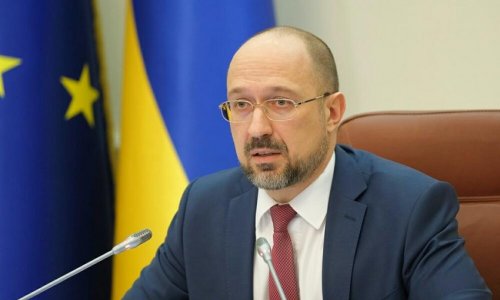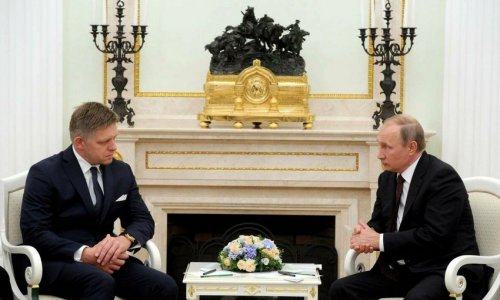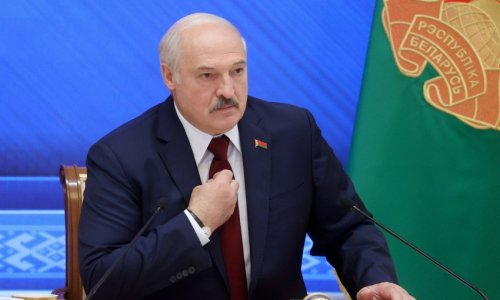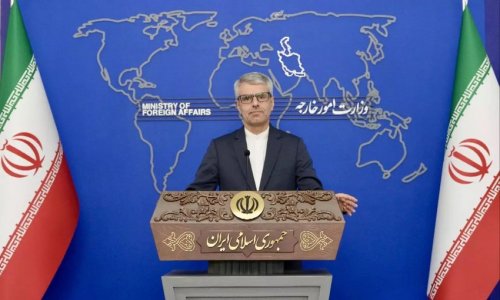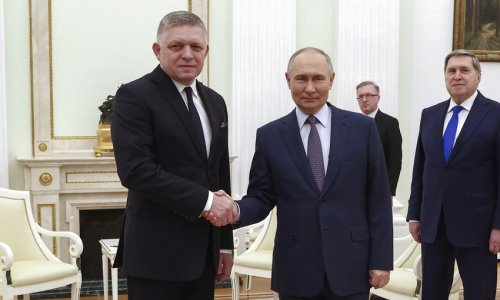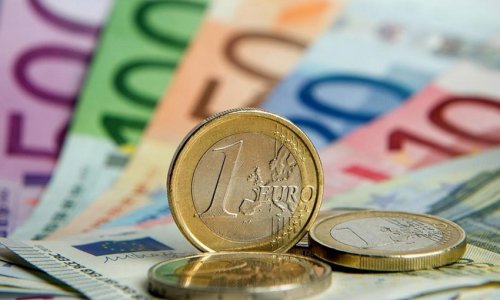Follow us !
How will the Ukraine crisis end? Five possible scenarios - OPINION
World
13:30 | 29.04.2014
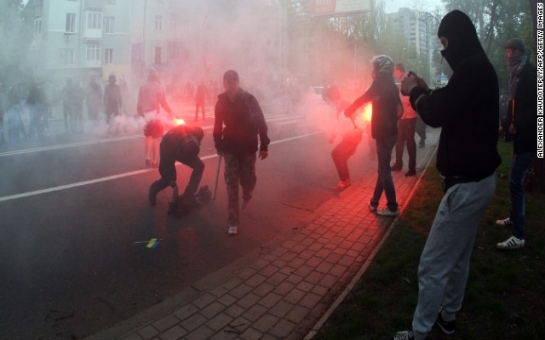
How will the Ukraine crisis end? Five possible scenarios - OPINION
Ukraine's young government is running out of viable options for restoring its control of eastern regions and preserving the country's territorial integrity. Government and police buildings in more than a dozen places are still held by pro-Russian protesters, sometimes led by masked and well-armed men in uniform. The response from Kiev to this assault has been inconsistent and hesitant.Amid a war of words between Washington and Moscow, the "agreement" reached in Geneva last week for resolving the crisis looks dead in the water. Russia and Ukraine accuse each other of bad faith, and on the ground there is a growing sense of stalemate, interrupted by episodes of violence that only harden views.Just one month before the Ukrainian presidential election, constitutional reforms that might mollify the pro-Russian protesters are still being thrashed out.The Geneva agreement called on the protesters to relinquish the buildings they hold and promised amnesty for those who do. But the immediate answer from behind the barricades was defiant.As one of the leaders of the occupation in Donetsk put it to CNN, "We have not come this far just to leave without our demands being met. It is the Kiev government that is illegitimate. They have to give up the buildings they have seized." There was a similar response from protest leaders in the southern city of Mariupol.So how might events in Ukraine unfold between now and the May 25 elections? Here are some of the scenarios that could play out, but events are moving swiftly and unpredictably.Peace breaks outThe Geneva agreement offered what U.S. President Barack Obama called "a glimmer of hope." But John Kerry, his top diplomat, cautioned after the talks: "None of us leave here with the sense that the job is done because the words are on the paper."The job of implementing the agreement has fallen to the Organization for Security and Co-operation in Europe (OSCE) which already has about 100 monitors in eastern Ukraine and is tasked with negotiating the surrender of occupied buildings.In Kerry's words, "what is vital is that the OSCE needs to get to work immediately to de-escalate the security situation in Luhansk, in Donetsk, in Slavyansk and all the other towns that have been destabilized."But the OSCE monitors have no powers of enforcement - and the visceral hatred of the pro-Russian groups for both the U.S. and Europe makes their task a daunting one. CNN met a team of observers in Slavyansk on Monday after they'd spent two hours with the self-declared mayor. They confined themselves to a brief statement that gave no indication of progress, and the Organization later acknowledged problems in gaining access to the town.Put simply, the occupiers don't see themselves as behaving illegally. Denis Pushilin, who's become the political voice of the so-called "Donetsk People's Republic," turned the tables on Kiev, saying the government (or junta, as pro-Russian groups prefer to call it) had come to power through a coup and was itself illegally occupying public buildings. Pushilin insisted that plans for a local referendum on Donetsk's future -- organized by the protesters -- would proceed. We heard the same message in Slavyansk, Luhansk and Mariupol.Much hinges on what sort of constitutional reform emerges. Kerry said Thursday that the Ukrainian government had gone "to extraordinary lengths to address regional demands for more autonomy, for local self-government, for the protection of minority rights." Visiting Donetsk recently, Prime Minister Arseniy Yatsenyuk promised far-reaching devolution to the regions, including greater control over their finances. But Russia wants more - a guarantee that Ukraine won't join NATO and direct elections in the regions to both legislative and executive office. One of the most centralized states on earth is demanding sweeping decentralization next door.As William Partlett, a lecturer at Columbia University's School of Law, writes in the magazine Jurist: "The 'framers' of the new Ukrainian constitution therefore are likely not to just be Ukrainians-and the bargaining is just as likely to take place in Geneva rather than Kiev."The government's attitude toward a referendum has been ambivalent. Acting President Oleksandr Turchynov has said he is "not against" a national referendum on the country's form of government, perhaps in tandem with the presidential vote.But the protesters say they will accept nothing less than a regional referendum that gives Donetsk and other eastern regions the option to secede from Ukraine. They have set up committees in Luhansk and Donetsk to plan a vote on May 11, though how it would be organized in an area with a population of more than 6.5 million people is open to question. Few of the protesters have any government experience: 32-year old Pushilin is a former security guard turned businessman and Irina Voropayeva, the spokeswoman in Mariupol, a housewife. And whether it would be seen as free and fair, without an independent election body or international observers, is questionable.The irony is that several polls conducted by Ukrainian NGOs in recent months suggest the supporters of unification with Russia are in a minority. The Institute for Social Studies and Political Analysis in Donetsk reported in March that two-thirds of respondents were not in favor of joining Russia. But a majority also thought Ukraine was going in the wrong direction.Ukraine's government recovers control of the eastOn the evidence of the past few weeks, that seems very improbable. Pro-Russian groups control buildings from Slavyansk in the north to Mariupol on the Sea of Azov. They are often led by "men in green," as the uniformed groups have become known. They are now the effective authority in swathes of Donetsk and Luhansk regions. Local police have either vanished or cut a deal with them.The army's first attempts to assert a presence in the east have been disastrous. South of Kramatorsk last Wednesday, CNN encountered a column of a dozen armored personnel carriers stranded either side of a railway line. Some 100 soldiers of the 25th Airborne Brigade, exhausted and dejected, were being harangued by local people, as the leader of a pro-Russian group negotiated terms for their release. Eventually they gave up much of their equipment and were allowed to leave, and the next day, Turchynov disbanded the unit. Six armored personnel carriers (APCs) from another unit were seized and paraded in Slavyansk.CNN followed one military convoy of some 70 vehicles for two hours across a rural swathe of Donetsk region. Several of its vehicles broke down; most were of Soviet vintage and in poor repair. Stragglers were left behind. Morale seemed brittle at best.Ukrainian police have been largely invisible as the crisis has unfolded. Riot police virtually surrounded a pro-Kiev rally in Donetsk to prevent clashes last week, but elsewhere local police have stepped aside whenever trouble has surfaced. At one roadblock, between Donetsk and Slavyansk, they have stood across the road as pro-Russian protesters check traffic.Civil warRussian President Vladimir Putin has said that Ukraine is on the brink of civil war, but it doesn't look like that. The pro-Russian protesters are often in dozens rather than hundreds and there is very little pro-Kiev sentiment on display. The pro-Kiev rally in Donetsk last week attracted about 1,000 people.There have been no large rallies or street clashes. Traffic streams down Artyoma Street in Donetsk, oblivious or used to the barricades of tires and Russian flags outside the regional government building, and children play on swings within sight of the coils of razor-wire.It seems many people here don't want to get involved. Some fear that they will be attacked if they show their colors. But the great majority are going about their daily business as normal, too preoccupied with making ends meet as the economy worsens and the value of the hryvna (Ukraine's currency) slides. It's down nearly 30% against the dollar this year. The last thing they want is violence.Katerina, a young mother out with her son in a Donetsk park last Friday, expressed the exasperation felt by many here."If my son asks me about what happened, we ourselves don't understand. Who is in power? Those people who are right? Or those who are not?" she said.In the countryside, life goes on slowly. Cows are led to pasture, elderly women sit on benches and gossip. The barricades seem a long way distant.There is a risk that ultra-nationalists in Kiev - known as the Pravy Sektor or Right Sektor - will organize groups to confront the enemy in the east. Pro-Russian leaders in Slavyansk accused the group of being behind a shooting at a rural roadblock on Sunday, and paraded ID tags allegedly identifying the assailants as members of the Sektor.Moscow chimed in, accusing Kiev of being "unwilling to put in check and disarm nationalists and extremists." Right Sektor swiftly denied it had any members in the area, and the incident seemed to raise more questions than it answered. But a rash of such incidents, however caused, could bring Russian intervention closer.A Russian invasionBoth Putin and Russian Foreign Minister Sergey Lavrov have said repeatedly that Russia has no plans to invade or annex eastern Ukraine, despite the presence of some 40,000 Russian troops close to the border. Such an incursion would lead to far more stringent sanctions against Russia by the West; and the use of conventional forces in an occupation would be a dangerous and expensive move at a time when the Russian economy is stuttering. In any case, Russia's interests are already being served by the "men in green," some of whom have come to eastern Ukraine from Russia, Crimea and Belarus, and who are chipping away at Kiev's authority in the region.But should the Ukrainian government try to reassert its authority in the east or Ukrainian nationalists arrive in numbers, leading to casualties among the protesters, Moscow's calculations might change. It has consistently promised to protect Russian "compatriots" in Ukraine, and during his lengthy news conference last week said: "I remind you that the Federation Council (the upper house of the Russian Duma) has given the president the right to use armed forces in Ukraine."He also used the term "Novorossiya" to talk about parts of Ukraine -- a word used during the 1700s to describe the Tsarist expansion of Russia's borders southward to the Black Sea. To those in the former Soviet republics who believe Putin's ambition is to restore a Greater Russia, it was a telling moment.Pro-Russian protesters in Ukraine call for Russian help on an almost daily basis, begging for protection from the "fascists." The self-declared mayor of Slavyansk, Vyacheslav Ponomarev, appealed to Putin directly Sunday, saying: "If you can't send peace-keeping troops, please help with food, weapons, whatever you can. Our people are ready to fight to defend our land from the fascist invasion."If these sporadic cries for help gather pace, with or without Moscow's encouragement, a full-scale Russian intervention cannot be discounted.The messy status quoTo many observers, that seems the most likely scenario - a stand-off between Kiev and pro-Russian groups in the east. The young and largely inexperienced Ukrainian government has shown itself incapable of dealing with the pro-Russian groups, who in turn don't have (as yet) the muscle to turn protest into outright secession.Ukrainian security forces even appear to be trying to lock in the contagion, with military and police checkpoints springing up on the borders between Kharkiv and Donetsk regions, and checkpoints around Donetsk city beefed up.There is growing coordination between the protesters in different cities, and the small groups of unknown uniformed men have shown it doesn't take much to seize buildings that are largely unguarded. A CNN team observed several vehicles with masked men leaving Slavyansk on Monday; two hours later they were involved in the seizure of the police station in nearby Kramatorsk. But the pro-Russian protesters don't appear capable of governing. Many of those milling about the regional government building in Donetsk wearing balaclava masks are teenagers. No political leader has yet emerged as a figure with whom the government (or the OSCE) could negotiate.The next steps will be the publication of a new draft constitution, and the May 11 vote organized by pro-Russian groups in the east. Turchynov, the acting President, insisted Tuesday that the "majority of Ukrainian citizens are for a united unitary democratic Ukraine with greater powers given to the regions."(CNN)ANN.Az

